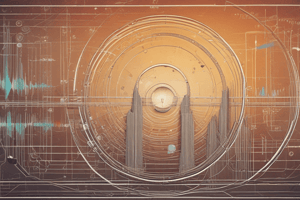Podcast
Questions and Answers
What is the result of multiplying 1.3 mL by 2.7 mL, considering significant figures?
What is the result of multiplying 1.3 mL by 2.7 mL, considering significant figures?
- 3.51 mL
- 3.5 mL (correct)
- 4 mL
- 0.04 mL
Which of the following numbers has the correct number of significant figures: 500.0?
Which of the following numbers has the correct number of significant figures: 500.0?
- 3 significant figures
- 5 significant figures
- 1 significant figure
- 4 significant figures (correct)
In 0.00845 g, which zeroes are considered significant?
In 0.00845 g, which zeroes are considered significant?
- Zeros between nonzero digits
- All zeroes
- Zeros to the left of the first nonzero digit
- Zeroes to the right of a decimal point (correct)
How many significant figures are in the number 0.0072 kg?
How many significant figures are in the number 0.0072 kg?
If a measurement is accurate to 0.1 g, what should be the rounding rule applied for the calculated result?
If a measurement is accurate to 0.1 g, what should be the rounding rule applied for the calculated result?
How many significant figures are in 10,040 m?
How many significant figures are in 10,040 m?
What is the general rule for the accuracy of a calculated result in terms of significant figures?
What is the general rule for the accuracy of a calculated result in terms of significant figures?
When rounding with significant figures, where should the final digit be rounded off to?
When rounding with significant figures, where should the final digit be rounded off to?
In a scientific measurement, what do significant figures help to convey?
In a scientific measurement, what do significant figures help to convey?
Why are significant figures important in comparing results against a reference interval or a clinical decision point?
Why are significant figures important in comparing results against a reference interval or a clinical decision point?
How are results often reported in routine chemistry laboratories involving significant figures?
How are results often reported in routine chemistry laboratories involving significant figures?
What is typically used to determine uncertainty in scientific measurements when calculating significant figures?
What is typically used to determine uncertainty in scientific measurements when calculating significant figures?
Flashcards are hidden until you start studying
Study Notes
Significant Figures
Rules for Determining Significant Figures
Significant figures are the digits in a number that are known with some degree of reliability. The rules for determining significant figures include:
- All nonzero digits are significant: 1.234 g has 4 significant figures, 1.2 g has 2 significant figures.
- Zeroes between nonzero digits are significant: 1002 kg has 4 significant figures, 3.07 mL has 3 significant figures.
- Zeroes to the left of the first nonzero digits are not significant; such zeroes merely indicate the position of the decimal point: 0.0010 C has only 1 significant figure, 0.012 g has 2 significant figures.
- Zeroes to the right of a decimal point in a number are significant: 0.023 mL has 2 significant figures, 0.200 g has 3 significant figures.
- When a number ends in zeroes that are not to the right of a decimal point, the zeroes are not necessarily significant: 190 miles may be 2 or 3 significant figures, 50,600 calories may be 3, 4, or 5 significant figures.
Calculations Involving Significant Figures
When performing calculations involving significant figures, it is essential to consider the rules for determining significant figures and round accordingly. The accuracy of a calculated result is limited by the least accurate measurement involved in the calculation. For example, in the calculation 3.000 + 1.5875 = 8.630829, the first division should result in 3 significant figures, the last division should result in 2 significant figures, and the three numbers added together should result in a number that is rounded off to the last common significant digit occurring furthest to the right.
Rounding with Significant Figures
Rounding is a crucial aspect of significant figures. The general rule is that the accuracy of a calculated result is limited by the least accurate measurement involved in the calculation. In rounding, we round off the final digit to the last common digit occurring furthest to the right in all components. For example, if we have two numbers, 100 (assume 3 significant figures) and 23.643 (5 significant figures), their sum is 123.643, which should be rounded to 124 (3 significant figures).
Applications of Significant Figures
Significant figures have various applications in scientific measurements. They are used to report values correctly, indicating the precision of the value. In scientific work, numbers are often the result of averages obtained from multiple experiments. The uncertainty is then given by the standard deviation, rounded off to one digit to obtain the number of significant figures.
Significant Figures in Scientific Measurements
Significant figures are crucial in scientific measurements because they help to convey the precision and uncertainty of the results. They are used to compare a result against a reference interval or a clinical decision point, as well as to monitor treatment by comparing sequential results. In routine chemistry laboratories, results are rounded, and a series of results are 'binned' together. This can hide a significant change in result, so the reporting interval should be such that any result change is greater than the analytical imprecision.
Studying That Suits You
Use AI to generate personalized quizzes and flashcards to suit your learning preferences.




